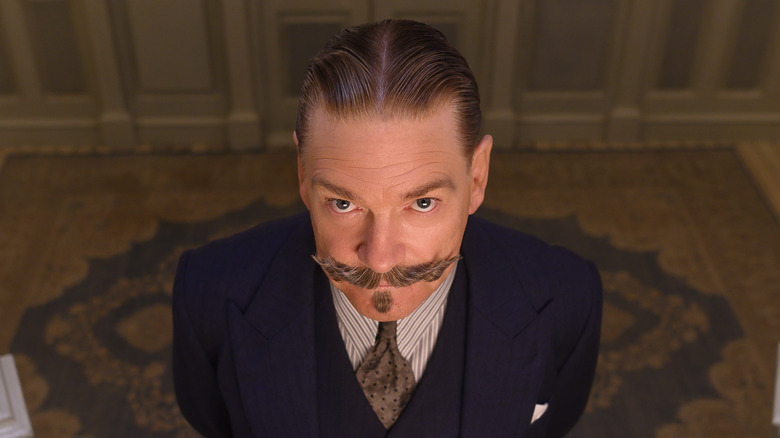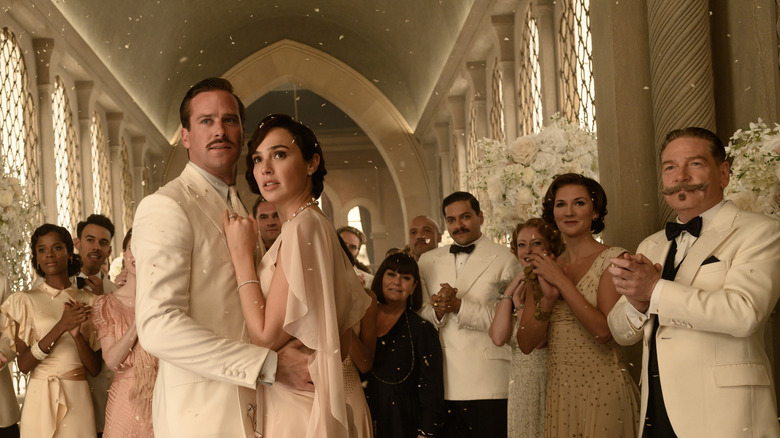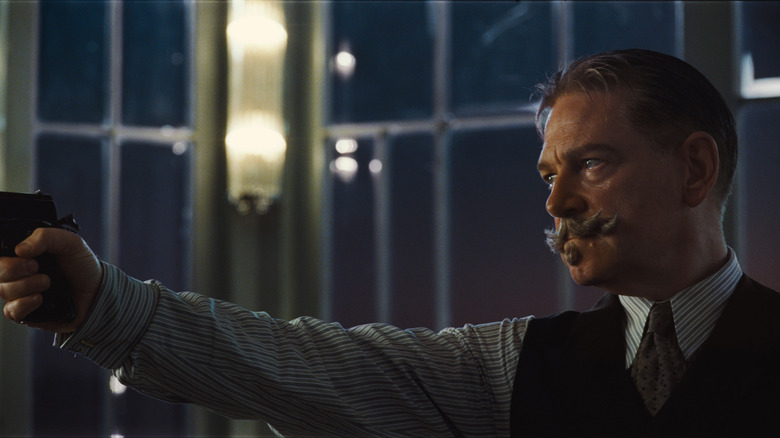Death On The Nile Review: Whydunit?
When 20th Century Fox released "Murder on the Orient Express" in 2017, it seemed like a foolproof method of bringing the mid-budget motion picture back to prominence. With Kenneth Branagh putting his own broad spin on Agatha Christie's Hercule Poirot, both behind the camera and behind the mustache, all the studio had to do to keep this refurbished franchise afloat was rinse and repeat. But two years later, while they were in the middle of shooting the follow-up "Death on the Nile," Rian Johnson ate their lunch.
"Knives Out," itself a Christie pastiche, used a similar formula to bring the whodunit back to relevance, but did it with a more interesting cast of characters and a new gumshoe in Daniel Craig's Benoit Blanc, swapping out Poirot's Belgian brogue for a Foghorn Leghorn southern drawl. The movie was even cheaper and nearly as profitable, but actually managed to leave a cultural footprint the nu-Poirot could not. Now, Netflix has sopped up "Knives Out" like a biscuit to gravy, with hotly anticipated sequels already on the way, while Branagh is on his awards season campaign for "Belfast" respectfully pretending "Death on the Nile" doesn't exist.
Who can blame him, though? On one hand, he's got a deeply personal and buzzed-about memoir of a film that's sure to get some Oscar nominations, if not some wins, and on the other, a Covid-delayed vestigial tail of a sequel whose marketing material has to nimbly cut around one of its "canceled" leads. Like a lot of post-pandemic releases, "Death on the Nile," from Disney's 20th Century Studios, feels like it's being dumped into the marketplace, with a hollow measure of advertising dollars hoping to create profit through sheer force of will.
Ultimately, "Death on the Nile" feels like little more than wounded obsolescence. Even at its intermittent best, it's a film trying to recapture a throwback genre but thwarts everything that makes that style of storytelling so evergreen by poisoning it with modern, groan-worthy tics.
Poirot begins
"Death on the Nile" is in almost every conceivable way a step down from Branagh's last outing with the character, to say nothing of the Peter Ustinov-led version from 1978 or the David Suchet television adaptation of Christie's novel from 2004. But it's not because Branagh and screenwriter Michael Green fail to depict the general gist of the source material, which remains largely intact down to the memorable twists at the center of its murder mystery. Instead, it's because of how much unnecessary elaboration and tedium they stitch around the periphery of the piece.
For the unfamiliar, the story centers around Hercule Poirot (Branagh), the world-famous detective, taking a holiday aboard the S.S. Karnak in Egypt that ends up interrupted by a murder. He's surrounded by the usual coterie of socialites brimming with plausible motives for having committed said murder, so he must conduct interrogations, piece together clues, and unpack the claustrophobic melodrama so dense it threatens to sink the very ship they're all stuck on. This particular subgenre has a well-worn but reliable shape, so there's ample room to make adjustments among the principal players in an effort to put new spins on old frameworks.
To its credit, Green's new staging of Christie's mystery makes room for a more diverse presentation of the original suspects list. Romance novelist Salomie Otterbourne and her daughter Rosalie become a jazz musician (Sophie Okonedo) and her niece (Letitia Wright). Andrew Pennington becomes Andrew Katchadourian (Ali Fazal), who is still a close confidante of the deceased, albeit it no longer a white one. The ensemble doesn't work quite as well as the one Branagh assembled for "Orient Express," but Hammer is pretty well suited to play Simon Doyle, the dashing cad who marries heiress Linnet Ridgeway (Gal Gadot), with Jennifer Saunders and Dawn French bringing the brisk warmth of their comedy act to a cast sorely lacking in charm.
But it's the way this mystery is arranged and how many ornamental pieces surrounding it bog the picture down that holds "Death on the Nile" back.
Firstly, Tom Bateman returns from "Orient Express" as Bouc, a friend of Poirot's who has far more importance to the plot here than in that prior film, which is strange enough as he isn't in the original book at all. A subplot involving Bouc and his mother Euphemia (Annette Bening) serves both as a detour from the main mystery at hand and as a needless bit of muddled continuity from how the last film ended, swapping out the suggestion that Poirot would be called to Egypt to solve a mystery with a convoluted new first act that sets Poirot closer to elements of the story that ought to predate his own involvement.
Secondly, echoing the way Poirot's memories of his lost wife intruded on the "Orient Express" proceedings, an ill-advised and inert romance between he and Okonedo's Salomie feels awkward and shoehorned in. It's clear that Green sought a way to strengthen some of the themes in the mystery, but attempts to do so here in a way that just feels ancillary.
And finally, this is a movie that opens with a ten-minute black and white prologue following a young Poirot in WWI, showing him using his mental acuity in the trenches while also answering why his facial hair is so garish.
Yes, this is a movie that feels we the audience need to know the origin of Poirot's mustache. But why?
The yassification of the cinematic universe
Every questionable decision designed to make "Death on the Nile" stand out from its prior adaptations only serves to make the film worse. But the reasoning behind these creative choices is indicative of a larger problem in the theatrical marketplace. Franchising fiction is a natural impulse. If you have a compelling character or characters an audience forms an attachment to, why not follow them through an ongoing series of adventures? It's the modus operandi behind so many successful novel series in the mystery world, and bringing that format to film and television has worked well for decades. There's a reason we're always getting new versions of Sherlock Holmes every few years.
But despite having dozens and dozens of Christie stories starring Poirot to pull from, where every couple of years Branagh and Green could just grab a book off the shelf and dust off the anachronistic edges that might prevent that source material from connecting to new audiences, both men have to iterate on something that already works by indulging the worst impulses Hollywood's need for everything to be a new MCU enables.
The books artfully trickle interpersonal details about Poirot to answer-hungry readers, so every nu-Poirot film should provide gobs of exposition and backstory about someone whose sole function is to solve a mystery in the present. Some of the most enduring adaptations of the source material position Poirot as a near-asexual "matchmaker" type meddling in the affairs of the people he meets, so nu-Poirot must oscillate between being a tragic romantic figure and being a tsundere for no reason other than maybe Branagh feels it absolutely necessary audiences know that his Poirot is popular with the ladies.
In the attempts to make Poirot the centerpiece of a burgeoning Christie-verse, the result is a film that costs more than its predecessor, despite somehow looking cheaper and flatter (a true feat given how calculated and lifeless "Orient Express" could be at times) while drowning an engaging mystery under layer upon layer of mythology building.
"Knives Out" may have left audiences wanting to know more about Benoit Blanc, but Johnson smartly knew that the consulting detective works best as a construct, and that the real drama comes from focusing on the suspects and bit players. "Death on the Nile" spends so much time trying to get into Poirot's head, understanding his past and his trauma and overcoming it to find some kind of happiness, that it renders the mystery he's here to solve a passing fancy, an undercard bout we may as well skip.
Well, there's always "Knives Out 2."


